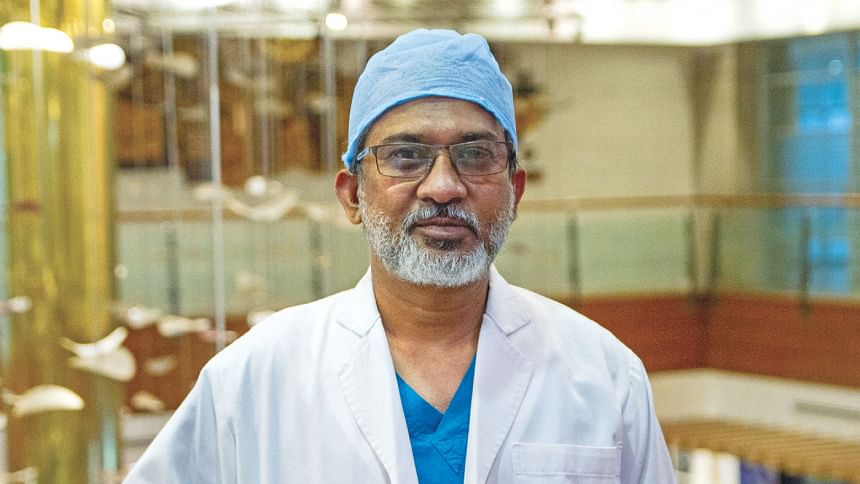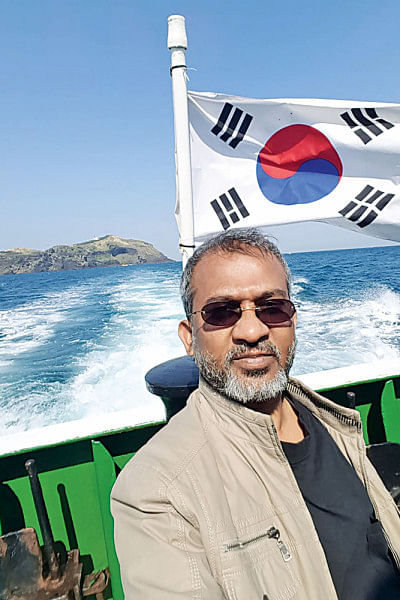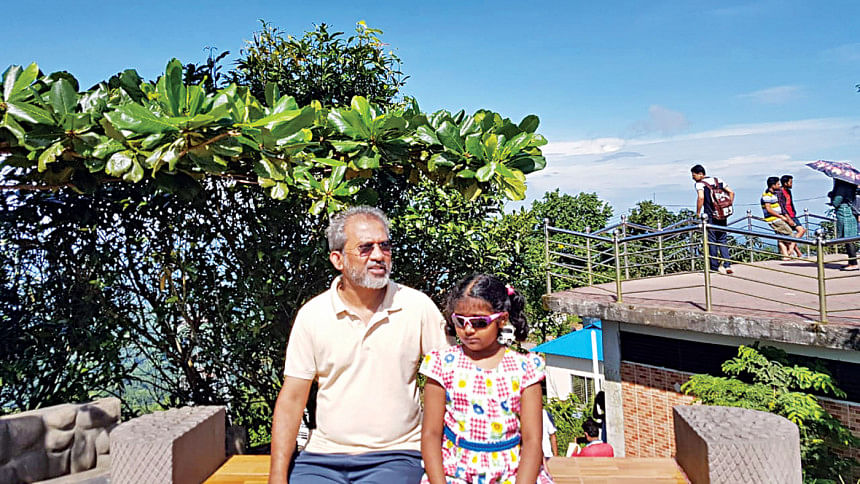Back Home at United Hospital Dr A M Shafique


Conversations during appointments with United Hospital's doctor A M Shafique usually go in a more serious vein — troubles of the heart that have nothing to do with romance. However, beyond the efficient and busy personas of doctors, it is easy to forget that these skilled medical professionals are also just human beings with a whole other life beyond their profession, where they nurture loved ones, follow passions, and also just have fun.
Equally at home with a scalpel and kitchen knives, Dr Shafique wears the doctor's gown with as much ease as the cooking apron. Look for him on a holiday morning, and he might be found standing in front of the stove, frying a golden omelette with a delicious base of shredded potatoes for breakfast, or something entirely exotic and oriental, as authentic Chinese is a cuisine he professes to like experimenting in. Or, simply cooking up ways to make his children eat their vegetables, which in itself is a testament to a parent's culinary skill. His own preference however, is the quintessential "daal-bhaat," and this vast dichotomy in cuisines is a good indication of the variety in this doctor's skills and interests.
Cooking and leisure are for the holidays, which are known to be few and sparse for the serious practitioners of the medical profession, especially with something as critical as interventional heart procedures which, by nature, can often be under emergency situations. What is life for this doctor on a normal day? Early mornings, routine procedures, currently enhanced by COVID-19 precautions, and then starting work at full steam from about 10 AM. This work can be simply attending visiting patients for the day, doing the rounds, or performing interventional procedures and providing critical care.
One of the most gratifying feelings for a doctor is when the most critical of patients make miraculous recoveries, Dr Shafique says, while recounting one of his most memorable, and not to mention, gratifying cases. Without revealing any personal information, the doctor narrated the story of this sexagenarian patient, flown in from Chattogram, presumably beyond recovery. The patient had already received about 33 minutes of CPR at a hospital in Chattogram, and his brain function could not be assessed. Once flown to United Hospital, Dr Shafique and his team kept working on the patient, who was taken to the ICU, and later put on the ventilator.
Sadly, one of the patient's children was feeling pessimistic, and suspected foul intentions of inflating the bills on part of the hospital. But the doctor's team kept on with treatment, as per the rest of the family's wishes. On this particular day, after having offered his Zuhr prayers, Dr Shafique was checking on the patient when he noticed a slight movement in the patient's leg. This prompted him to do a chest compression, and the patient suddenly opened his eyes, and by the next day, he had improved enough to be taken off the ventilator.
To this day, Dr Shafique remembers the elation he felt at this man's miraculous recovery.
Was this gratification the motivation to be a doctor? Truthfully, it wasn't, because he did not even choose this profession, rather life chose this as his calling. After sitting for various entrance exams after passing his intermediate back in the day, a young Shafique chose economics as his subject at Jahangirnagar University, oblivious to the fact that his name had actually been included in the waiting list for the Sher-e-Bangla Medical College. When his friend informed him, he asked her to not tell his family, for he was already looking forward to classes at Jahangirnagar. But of course, as friends are wont to do, she went straight to his family, and the young Shafique was packed off to Barishal to become the "one doctor in the family" that all Bangladeshis want. But medicine pulled him in.
By choice or luck, medicine has since then been the main focus and passion for Dr Shafique.
Later, after joining United Hospital in its early days, his dedication to the hospital made one of the friendly nurses quip, "Don't marry the Hospital, Doctor!"

His work since then took him to various parts of the country, from Chattogram in the south to Dinajpur in the north. In Dinajpur, Dr Shafique performed the region's first local angioplasty, after a struggle with the population's innate mistrust of the local healthcare facilities, which were of course limited in their resources. But once he earned that trust, it is the adoration he received that he still remembers.
"I couldn't pay at the sweets shop for the 'kheershapati' (sweets) even after offering for 3 days," he said. Enamoured with the doctor's dedication, patients' families often pressed upon him to attend the chehlum programmes of his patients, he remembers.
The dynamism in the person that is Dr Shafique can be guessed by the range of extracurriculars that he used to be involved — debating, drama, scouting, and even being the MC for various cultural shows. But did that all suffer at the hands of his dedication to being a cardiologist? Did his family life suffer?
Dr Shafique says he has been lucky, as his children perhaps were a little deprived of his time, but missed him a little less for their living in a joint family, with the families of three brothers residing together. His wife, being a doctor herself, is also understanding.
For Dr Shafique, life has come full circle professionally, as he recently re-joined United Hospital after serving in Chattogram for some time. How does it feel?
"I am back home," he says.
Photo: Nayem Shaan and Personal Collection

 For all latest news, follow The Daily Star's Google News channel.
For all latest news, follow The Daily Star's Google News channel. 



Comments